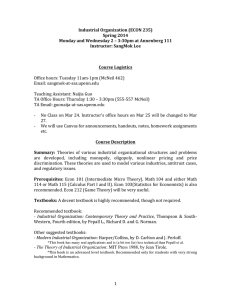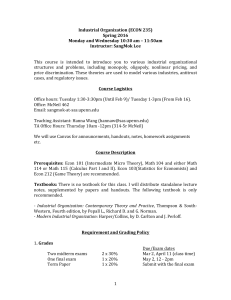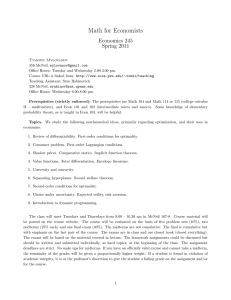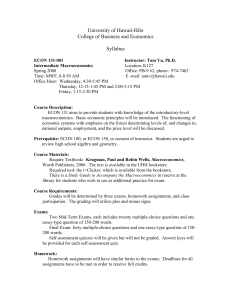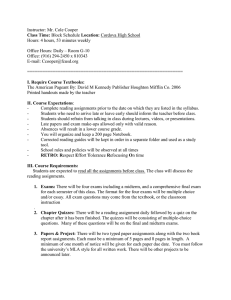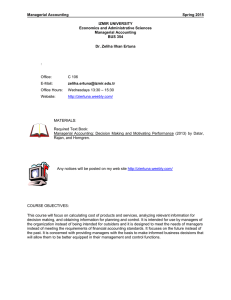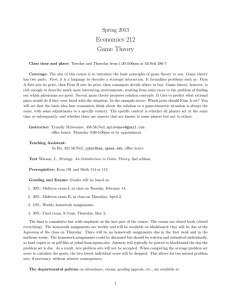Document 11221715
advertisement
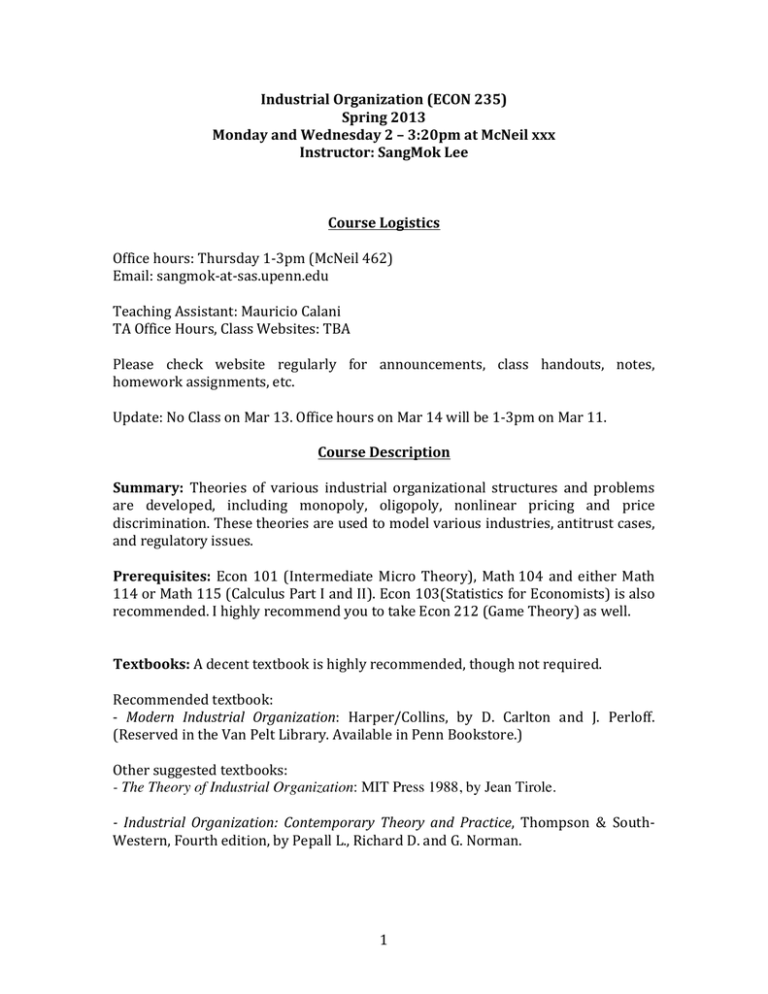
Industrial Organization (ECON 235) Spring 2013 Monday and Wednesday 2 – 3:20pm at McNeil xxx Instructor: SangMok Lee Course Logistics Office hours: Thursday 1-­‐3pm (McNeil 462) Email: sangmok-­‐at-­‐sas.upenn.edu Teaching Assistant: Mauricio Calani TA Office Hours, Class Websites: TBA Please check website regularly for announcements, class handouts, notes, homework assignments, etc. Update: No Class on Mar 13. Office hours on Mar 14 will be 1-­‐3pm on Mar 11. Course Description Summary: Theories of various industrial organizational structures and problems are developed, including monopoly, oligopoly, nonlinear pricing and price discrimination. These theories are used to model various industries, antitrust cases, and regulatory issues. Prerequisites: Econ 101 (Intermediate Micro Theory), Math 104 and either Math 114 or Math 115 (Calculus Part I and II). Econ 103(Statistics for Economists) is also recommended. I highly recommend you to take Econ 212 (Game Theory) as well. Textbooks: A decent textbook is highly recommended, though not required. Recommended textbook: -­‐ Modern Industrial Organization: Harper/Collins, by D. Carlton and J. Perloff. (Reserved in the Van Pelt Library. Available in Penn Bookstore.) Other suggested textbooks: - The Theory of Industrial Organization: MIT Press 1988, by Jean Tirole. -­‐ Industrial Organization: Contemporary Theory and Practice, Thompson & South-­‐ Western, Fourth edition, by Pepall L., Richard D. and G. Norman. 1 Requirement and Grading Policy 1. Grades Due/Exam dates Three problem sets 3 x 10% Jan 30, Mar 18, Apr 17 Two midterm exams 2 x 20% Feb 13, Mar 27 (class time) One final exam 1 x 30% May 1 (9-­‐11am) 2. Midterm and Final examinations will be in-­‐class and closed-­‐book. Collaboration on the examinations is prohibited. 3. Assignments will be given one-­‐week prior to the due dates and will be due at the start of the lecture on the day they are due. You can submit in class, or electronic submission via email is also allowed. Collaboration on homework assignments is allowed and encouraged, but final solutions must be written independently. Each student should participate fully in solving each problem and understand the answer. Topics to be covered (Subject to change) I. Market structure 1. Intro & Review. Technology and Costs. Perfect competition. Monopoly. Measuring market power. 2. Imperfect (oligopolistic) Competition. Introduction to game theory. Static games. Nash Equilibrium. Prisoner’s dilemma. Cournot model. Bertrand model. Capacity constraints in price competition. 3. Cartels and collusion Multi-­‐period (“dynamic”) games. Extensive form games. Subgame perfect equilibrium. Stackelberg model. Repeated games and tacit collusion. II. Firm practices 1. Incumbent advantage. Incumbent advantage. Limit pricing and credibility. Dixit model of capacity investment. 2. Product differentiation. Product differentiation resolves Bertrand paradox. Spatial Competition. Pricing, Location and Entry. 2 3. Price discrimination. Perfect, 2nd-­‐degree, 3rd-­‐degree price discrimination. Nonlinear pricing and bundling. Application: post-­‐patent drug price anomaly. 4. Vertical integration and vertical restraints. Vertical Externalities (Double Marginalization, Downstream Moral Hazard). Vertical integration and vertical Restraints (Exclusive Territories, Tie-­‐In, Resale Price Maintenance, etc.). III. Information economics 1. Price dispersion and search. Price dispersion for homogeneous products. Diamond paradox. Equilibrium price dispersion with costly search. Applications: online books, gasoline markets. 2. Auctions. Games of incomplete information. Bayesian equilibrium. First-­‐price auctions, second-­‐price auctions. Winner’s curse. Applications: online auctions. 3. Additional topics (as time allows). Dynamic models and market clearing. Patents. Other Course Policies 1. Late assignments will not be accepted without either proper prior arrangement or a compelling and verifiable reason. 2. All hand written answers to exam questions should be legible. Anything that the TA or I cannot read or understand is wrong. 3. Assignments and exams will be returned to you during class. You are responsible for picking them up. Your exams will be scanned to deter cheating. 4. A request for a re-­‐grade of a problem set or an exam must be submitted to me in writing within 1 week after the graded assignment has been returned. In such a case, I will reevaluate your complete homework set or exam. 5. If you miss an exam, you need to obtain a letter signed by the coordinator of the undergraduate studies, Lynn Costello, that excuses your absence. If you do not obtain such a letter, you will fail the exam. 6. There are no make-­‐up midterm exams. If you have to miss one in-­‐class midterm exam, the other mid-­‐term exam and the final exam will be worth 30pts and 40pts, 3 respectively. If you have to miss the final exam, following the departmental policy, a make-­‐up exam will be given in the designated make-­‐up exam week (first week of the following semester). 4
